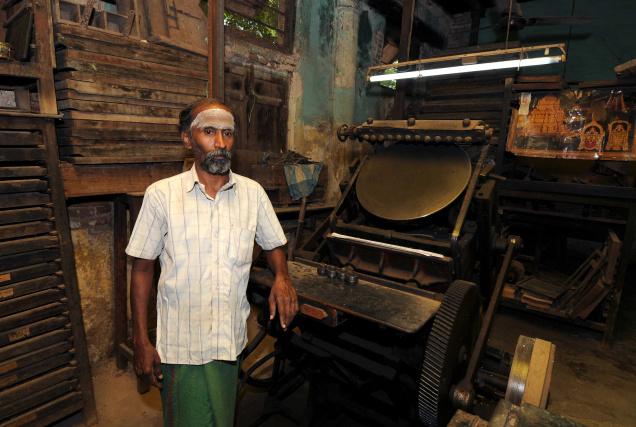
Despite all odds C.N. Manikkam and his 82-year-old binding and printing machines hang on stubbornly, refusing to be swept away by modernity
Manikkam sits still in his dimly lit office, gazing at the bustle of Triplicane outside. He has no one for company, except the ancient binding and printing machines he inherited from his grandfather. Together, man and machine seem to be in a trance. Tucked behind a bus stop on Triplicane High Road, Green & Co. is almost invisible to the eye. It’s the rusted name board that attracts the observant passerby. It fights for space with those of the neighbours’, but is determined to announce the shop’s presence. The board just won’t give up; it hasn’t been dusted or painted; no one cares much for it. But it goes on with its job — much like C.N. Manikkam.
“The company was started by my grandfather S. Chengalvaraya in 1932,” says the 55-year-old. A native of Chengalpattu, Chengalvaraya travelled to Burma and Bombay for work and arrived at Madras to set up a company to employ the skills he acquired from his travels. “The chunk of his earnings was obtained from binding school books and bill books, and printing wedding cards and posters,” explains Manikkam. “He rented an office for Rs. 3. The property belongs to the Nawab of Arcot. It was once a stable for royal horses,” he claims.
Chengalvaraya composed every word by hand, as was the technology in his time. “He had 20 people working for him. There were five in each department such as printing, binding, and cutting,” says Manikkam. Chengalvaraya would sit by the wooden table at the entrance, overseeing the work. His son Nagalinga took his place in 1950 — his workforce was cut by half due to falling demand. Today, Manikkam sits at the same table — he is the boss, he is the worker. “Sometimes, my brothers give me a hand,” he says. “My sons are in the IT field. They are not interested in printing,” he adds.
“Technology has advanced. People have moved on,” says Manikkam. Everything in his office, from the rooms where the printing and binding work is done to the high Bombay terrace with teakwood beams, is just as it was during his grandfather’s time. The type cases with their small cabinets and types in varying sizes and alphabets, the Indo-Europa Trading Company’s binding machine from Punjab…they stand in the same positions that they did over 80 years ago.
Manikkam hand-binds books using his grandfather’s method. “Hand-bound books withstand wear and tear,” he says. “We do not use pins. The pages are stitched together by hand.” Such books are known to last for over 50 years, he says. “It depends on how well it is maintained. We have seen hand-bound dictionaries and ledgers outlive men.”
Orders have dwindled and Manikkam leads a lonely life at work. But he refuses to progress to advanced machines. “The technology that I use requires skill. A man has to work for at least 15 years to become an expert at the job. We still have our regular customers who are not comfortable with the current crop of printing units,” he says. But why is he so unrelenting? “I tried,” he sighs. “I tried to learn to use a computer. But my mind won’t cooperate,” he shrugs. “I’m happy doing this. This is what I know; this is what I respect.”
source: http://www.thehindu.com / The Hindu / Home> Features> MetroPlus> Society / by Akila Kannadasan / August 04th, 2014